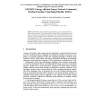Free Online Productivity Tools
i2Speak
i2Symbol
i2OCR
iTex2Img
iWeb2Print
iWeb2Shot
i2Type
iPdf2Split
iPdf2Merge
i2Bopomofo
i2Arabic
i2Style
i2Image
i2PDF
iLatex2Rtf
Sci2ools
125
click to vote
ICN
2005
Springer
2005
Springer
ESCORT: Energy-Efficient Sensor Network Communal Routing Topology Using Signal Quality Metrics
ESCORT aims at decreasing the energy cost of communication in dense sensor networks. We employ radio frequency (RF) signal quality assessment in forming communities of redundant nodes. These communities avoid spanning regions of environmental interference to preserve the routing fidelity of the network. ESCORT is routing protocol-independent and conserves energy by alternating redundant nodes’ radio duty cycles. Simulation demonstrates that ESCORT enables nodes to deactivate their radios more than 60% of the time while sustaining acceptable communication performance.
| Added | 27 Jun 2010 |
| Updated | 27 Jun 2010 |
| Type | Conference |
| Year | 2005 |
| Where | ICN |
| Authors | Joel W. Branch, Gilbert Chen, Boleslaw K. Szymanski |
Comments (0)

